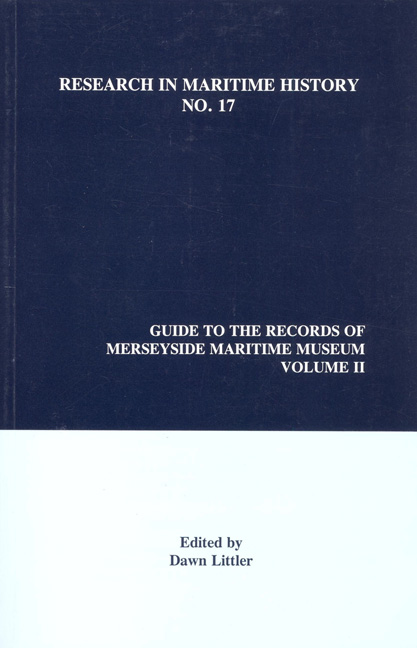Book contents
- Frontmatter
- Contents
- Introduction
- Notes on Access and Use of the Archives
- Acknowledgements
- Notes on the Editor
- List of Illustrations
- Chapter 1 Merchants, Ship Brokers and Agents, Stevedoring and Warehousing Companies
- Chapter 2 Transatlantic Slavery and Slave Trading
- Chapter 3 Emigration
- Chapter 4 Maritime Charities, Missions and Educational Establishments
- Chapter 5 Shipbuilding and Repairing, Engineering and other Maritime Trades
- Chapter 6 Maritime Families
- Chapter 7 Seafarers and Other Individuals
- Chapter 8 Special Collections: Titanic and Lusitania
- Chapter 9 Pictorial and Audio
- Chapter 10 Maritime Library
- Chapter 11 Research, Miscellaneous and Non-Maritime
- Chapter 12 Addenda to Guide, Volume I
- Index
Chapter 3 - Emigration
- Frontmatter
- Contents
- Introduction
- Notes on Access and Use of the Archives
- Acknowledgements
- Notes on the Editor
- List of Illustrations
- Chapter 1 Merchants, Ship Brokers and Agents, Stevedoring and Warehousing Companies
- Chapter 2 Transatlantic Slavery and Slave Trading
- Chapter 3 Emigration
- Chapter 4 Maritime Charities, Missions and Educational Establishments
- Chapter 5 Shipbuilding and Repairing, Engineering and other Maritime Trades
- Chapter 6 Maritime Families
- Chapter 7 Seafarers and Other Individuals
- Chapter 8 Special Collections: Titanic and Lusitania
- Chapter 9 Pictorial and Audio
- Chapter 10 Maritime Library
- Chapter 11 Research, Miscellaneous and Non-Maritime
- Chapter 12 Addenda to Guide, Volume I
- Index
Summary
Liverpool played an important role in facilitating mainly the poor, the ambitious or the persecuted to seek a new and (hopefully) better life across the Atlantic in North America. Passengers, some of whom were emigrants or indentured servants, were carried regularly to North America and the West Indies from about 1660 onwards. Numbers began to increase with the growth of population in the early nineteenth century. Emigrants were also attracted not only from the north west but from other parts of the British Isles and later with the establishment of North Sea steamers and railway links from the mainland of Europe. This was because Liverpool had come to dominate North American trade especially from New York. The establishment of regular sailing packet lines from 1818 and the huge demand for North American raw materials by British industries especially cotton and timber, stimulated imports. Emigrants along with British manufactures provided a useful return cargo. Ship's ‘tween decks could be easily converted to steerage accommodation by building temporary bunks. The Irish potato famine of 1846-1847 expanded the demand for emigrant passages and by 1851 it was the pre-eminent port in Europe with 159,840 passengers sailing to the United States, as against the second, Le Havre, with 31,859. In the same decade, it played a major role in the rush of emigrants seeking their fortune in the Australian gold fields. But this emigrant traffic and that of New Zealand that began to grow in the 1860s, was shared with other ports, especially London, Southampton and Plymouth.
Most early steamship lines including Cunard refused to carry emigrants until the 1860s with the exception of the Inman Line. As competition increased between the lines (and there were the Cunard, White Star, Allan, Inman, Guion and National Lines all sailing from Liverpool by the 1870s) emigrants were not only accepted but actively recruited through passenger agents in the United Kingdom and Europe. The shipping companies also provided accommodation ashore while the emigrants waited to board their ship because Liverpool and its “land sharks” had a notorious reputation for their exploitation of emigrants.
However, Liverpool's dominant position as the main transatlantic and as an emigrant transhipment port, was gradually eroded in the late nineteenth century by competition from Southampton and the German ports of Bremerhaven and Hamburg, all of which had great geographical advantages over Liverpool.
- Type
- Chapter
- Information
- Guide to the Records of Merseyside Maritime Museum , pp. 45 - 78Publisher: Liverpool University PressPrint publication year: 1999

